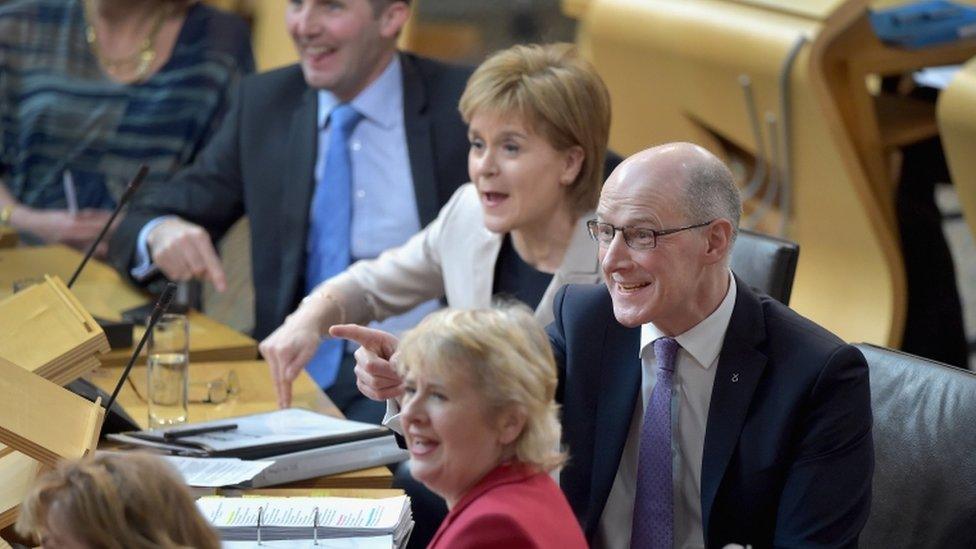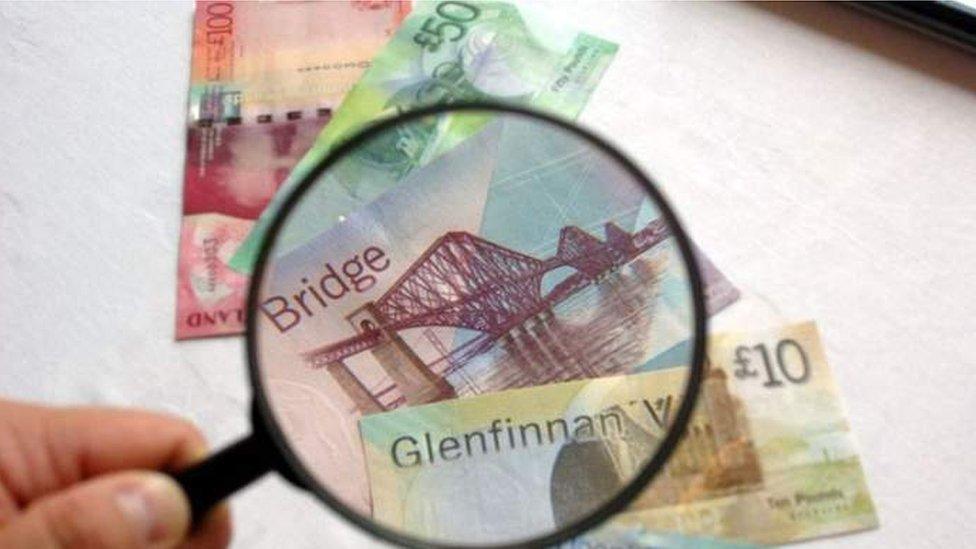Scottish budget: The morning after the night before
- Published

Mr Swinney stuck to his guns over the principle of no detriment
If it all seemed a little tame, blame the contrast with the previous day. After all, what was at stake at Holyrood today? Nothing much. Just around £30bn of expenditure upon education, health and the rest.
Where was the drama of Fiscal Framework day? The torpor, the tension. The last-minute deal. The twin announcements at Holyrood and Westminster confirming that everybody had won.
More is emerging from the chatter in the Garden Lobby. Apparently, Scottish Ministers and advisers had concluded a deal was improbable. Certainly, such was evident from John Swinney's demeanour when he gave evidence at 08:30.
By early afternoon, when Nicola Sturgeon updated MSPs, a deal began to look more likely. By mid to late afternoon, the deal was done. What were the factors influencing that outcome?
One, John Swinney refused to budge on the Smith principle of no detriment. He compromised on related aspects - but stuck to his core point.
Two, Mr Swinney agreed to a core Treasury demand - that fiscal data should be independently generated, rather than produced by the Scottish government and independently audited. Only a cynic would say Mr Swinney created this obstacle in order to concede it later.
'Issue of trust'
Three, Scottish Ministers - and MSPs such as Alex Salmond - privately and openly played the EU Referendum card. In essence, they whispered to the prime minister: "Do you really want to pick a fight with us - on an issue of trust arising from an earlier referendum - at the precise moment when you need our unalloyed support for the EU ballot?"
Four, the Chancellor (and the PM) opted for the big picture. They decided to fight another day on Scottish expenditure, choosing to bank the prize of Scottish self-funding. A prize which fits their longer-term narrative that the debate in Scotland must now turn to the use of powers, rather than the process of devolving them.
A prize which, further, helps the Conservatives counter claims - heard in the Commons again today - that Scotland is subsidised by England. Set aside for a moment the arguments over arithmetic. Think politics. Tories want an answer to that point on English doorsteps. They believe they now have it.
Fascinating stuff. And so, in a different way, was today's Stage Three debate on the budget. Firstly, robust exchanges over the impact of public service spending constraint. John Swinney said only 500 devolved public sector jobs had gone in the past year, compared with a 20,000 increase in overall employment.
Penny on tax
Mr Swinney's critics dissented volubly. Sundry SNP MSPs retorted that there was often a big difference between outline plans produced by local authorities - and the eventual outcome.
In addition, we had in outline the forthcoming election contest. The SNP offer on protecting families - no tax increase, a council tax freeze, no tuition fees, no prescription charges.
We had the Labour offer: a penny on tax mainly for education with a (contested) rebate offer for the low paid.
The Lib Dem pitch: a penny on tax purely for education, with more details due to be unveiled at the party's conference later this week.
The Conservative plan - taxation in line with UK or conceivably lower (that debate is still underway within the Scottish party.)
And we had in embryo the debate hereafter. When all income tax rates and bands are set by Holyrood, as they will be from 2017. Scottish politics has been transformed.
- Published23 February 2016
